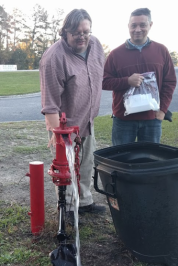NC Well Water Working Group collaborates to address water quality issues across the state
In February 2024, the UNC SRP Community Engagement Core (CEC) convened the North Carolina Well Water Working Group (NCWWWG) to discuss: requirements for real estate transfers, the potential health effects of contaminated well water on pregnant women and children, plans for testing well water contamination, and resources for addressing naturally-occurring well water contaminants.
The NCWWWG seeks to coordinate efforts among NC well water projects. The group includes UNC researchers, policy experts, lawyers, and community advocates, as well as state and local government, and community-based organizations working on private well water issues.
Changes to real estate disclosure forms

Maria Savasta-Kennedy, JD
Maria Savasta-Kennedy, Clinical Professor of Law in the UNC School of Law and an NCWWWG founding member, discussed efforts to incorporate a question about private well testing into the residential property disclosure statements developed by the North Carolina Real Estate Commission. Building on collaborative efforts with the CEC and other working group members to educate real estate brokers and realtors about private well testing, this new question requires sellers to indicate whether dwellings supplied by private well water have ever had the water supply tested for quality, quantity, and pressure and if so, to provide the date of the test. The NC Real Estate Commission recently approved and added the new question to the Disclosure Statement, effective July 1, 2024.
“This important change highlights to both buyers and sellers of residential property that well water should be tested,” says Savasta-Kennedy. “Hopefully it will spur buyers to do their own testing if there have been no recent tests, and to inquire further, thus discovering contamination on the front end, when they may be in a better position to negotiate a solution.”
Links between toxic metals and pre-term births

Dr. Lauren Eaves
Dr. Lauren Eaves shared her work leveraging the NCWELL dataset, an expansive public database of private well water test results, to discover links between toxic metals in well water and preterm birth. She combined NCWELL data and birth certificates from the same periods to estimate the influence of toxic metals mixtures on preterm birth rates across North Carolina. Dr. Eaves found lead and cadmium (alone and in combination with chromium) showed increased odds of preterm birth across the state. The study also found that the effect of metals on preterm birth was most pronounced among American Indian individuals. The reason for these disparities remains unclear.
“While more research is needed,” notes Eaves, “documented disparities in access to and use of testing and treatment for well water are likely contributing factors.”
A recent publication by Eaves and other members of the NCWWWG and UNC SRP, “Toxic metal mixtures in private well water and increased risk for preterm birth in North Carolina”, was highlighted in an interview with CBS 17, an NC Newsline story, and a story by UNC Gillings School of Public Health.
Investigating well water quality in Robeson County

Mr. Currie and Dr. George take well water samples as part of a previous research study in Robeson County.
Jefferson Currie II, the Lumber Riverkeeper, led a discussion focused on identifying NCWWWG resources that could be leveraged to help residents in Robeson County, NC who are reliant on private well water for drinking. Mr. Currie has been working with members of the Lumbee Tribe of NC to address concerns about pollution from a landfill near Maxton Pond, an important cultural resource, and to enhance water safety for boating, swimming, and fishing.
According to Mr. Currie, recent tests of creek sediment downstream of the landfill showed high levels of arsenic and chromium. Residents have expressed concern about water quality in light of potential contamination from the landfill and the large number of wells in the area drawing from shallow aquifers. Mr. Currie, a member of the UNC SRP Public Health Action Committee, brought those concerns to the CEC, and together, they are planning for upcoming private well testing near Maxton Pond.
Continued collaboration
The final presentation of the meeting, by Dr. Andrew George of the UNC SRP CEC, highlighted recent well-testing efforts in Union County, NC. Recently, a group of residents from the Indian Trail community used their results from this study to convince their town council to approve funding for the extension of public waterlines.
In the coming months, the group plans to finalize policy recommendations related to well testing and treatment, highlighting innovative and health-protective well water case studies across the state.
“Scientists, lawyers and community activists often work in silos,” added Savasta Kennedy. “These meetings provide a space to learn what is happening across sectors, ask questions and collaborate with one another on this vitally important issue.”
To participate in future NCWWWG meetings, contact Dr. Andrew George at andrewg@email.unc.edu.
